South Africa's cash-in-transit heists: A national emergency?
- Published
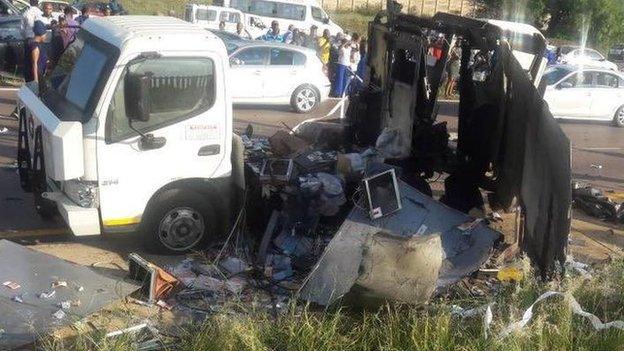
Commercial-grade explosives have been used in several robberies
The shaky footage could come from a film: men standing on the grassy verge wielding AK-47s, bombs exploding, and the sound of gunfire.
But this is not the latest action blockbuster. This is a small South African town in the middle of the day, and what the shocked driver is recording from the relative safety of his own vehicle is a scene being repeated across the nation on an almost daily basis: a cash-in-transit heist.
It is an epidemic which has seen millions of rand disappear into the hands of highly organised criminal gangs - a crime spree which some say can be traced back to the police themselves, and that others suggest is being orchestrated by criminals already serving time behind bars.
It is, according to those in the know, seen as high prestige and low risk - at least, for those carrying out the attacks.
What is happening?
Since the start of the year, there have been more than 150 "cash-in-transit" robberies - equating to more than one a day.
There are a number of approaches. It can involve a gang swooping on an armoured vehicle as it drives down the road, shooting out the tyres before using explosives to get the doors open.
Or the security guard can be targeted when they are at their most vulnerable: as they leave the premises carrying the cash, in what is known as a "cross pavement" attack.
The latter is where the real rise has come in, Anneliese Burgess, a journalist who has spent the last few years researching the phenomenon for her book, Heist! South Africa's cash-in-transit epidemic, tells the BBC.
"It is extraordinary: the incredible brazenness of these acts," she explains. "They just attack people, just shoot them in the back of the head."
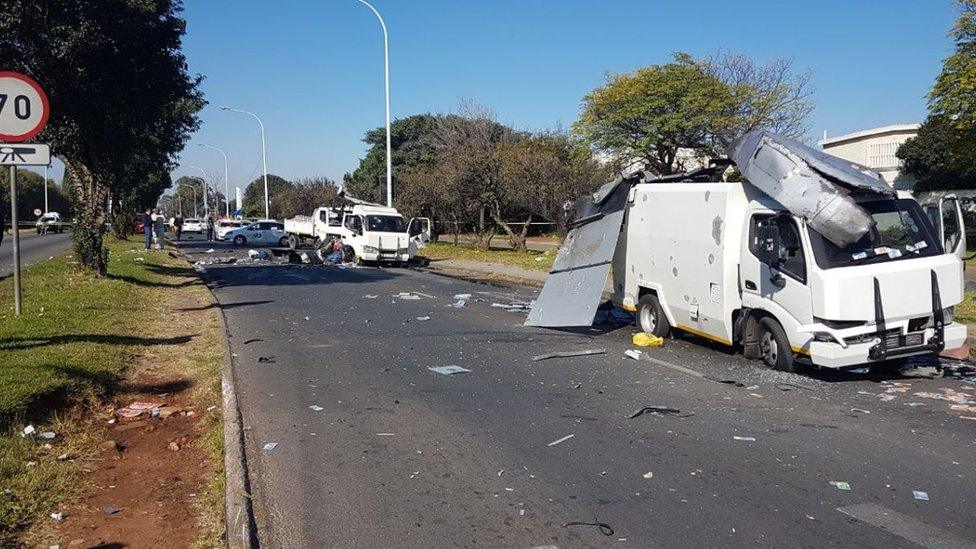
Eight people were injured in this attack on two vans carrying cash
"These gangs of criminals do not have due respect for the lives of our people here in this country," agrees Brig Hangwani Mulaudzi, South African Police Service spokesman.
"The nature of criminal conduct is scary - they are using explosives. It is groups of people firing high-calibre firearms."
Who are the robbers?
The gangs, according to Yusuf Abramjee, an anti-crime activist, range in size from about 10 to 20 members, and are just as confident in conducting a broad daylight strike in the cities as they are out in the countryside.
And when they strike, they are well prepared: AK47s, other assault rifles and commercial-grade explosives - allowing them to blow the back of a van off, and then walk away with the money.
"What we are dealing with is organised crime," Mr Abramjee says.

More from South Africa:

But these are no ordinary criminals, says Ms Burgess. The "foot soldiers" - the men who carry out the heists - have worked their way up from home burglaries and car-jackings to become part of these gangs.
"By the time you are selected, you are seen as the cream of the crop, so to speak," Burgess tells the BBC.
At the top, she adds, are about 200 "kingpins", who will work across province boundaries to carry out attacks with, as Mr Abramjee notes, apparent "military precision".
That high level of organisation has led some, like Mr Abramjee, to believe people with experience in the armed forces may be involved.
And then there are the policemen.
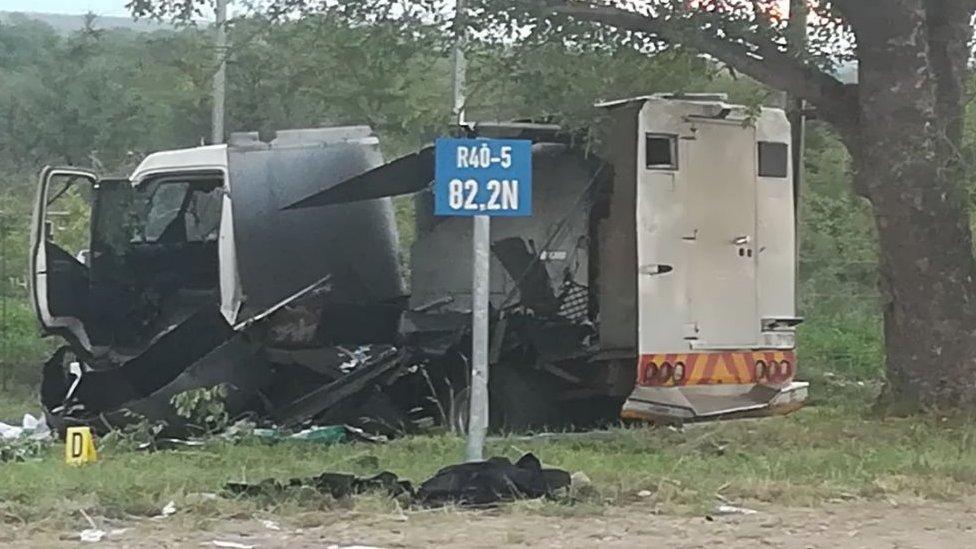
There has been an attack each day so far this year
Ms Burgess can list a number of cases which have been directly linked to police officers - although, she points out, most of them are working at a "low level" within the service, helping make the arrest dockets disappear when gang members are finally apprehended.
There have been other cases when police officers have been far more involved, including one former officer in South Africa's elite unit, the Hawks, who was allegedly due to pocket tens of millions of rand for his role keeping a gang out of trouble in just one heist.
He has since been found guilty.
Brig Mulaudzi, however, is keen to say corruption within the force is not endemic, and those who are have been weeded out.
The problem, he adds, is also not limited to the police.
"The issue of corruption - in terms of how the money is moved - that is information which is confidential, but these guys are able to get it," Brigadier Mulaudzi points out.
Mr Abramjee agrees: "We are dealing with insider involvement. Most certainly these are not random acts. They know where the cash depots are."
What are the authorities doing?
As videos and pictures of the heists and their aftermath continue to go viral, questions are being asked about how the situation was allowed to reach this point.
There was a 104% rise in cash-in-transit robberies from 2016 to 2017, when there were 378. With 153 to 31 May, it seems 2018 will hit a similar high.
"These people are making off with millions of rand," Mr Abramjee points out. "We are dealing with a national crime emergency."
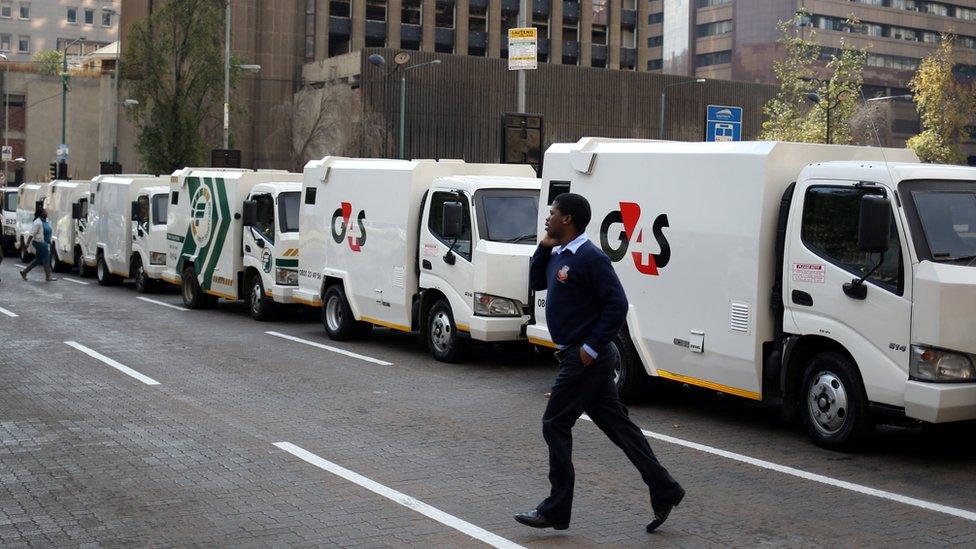
Security guards came together to protest against the attacks in Johannesburg on 12 June
It has not been helped by what Brig Mulaudzi admits was a "vacuum" of intelligence within the police force. But, he says, that is now being rectified.
There has, Ms Burgess says, been "an enormous" crackdown on the gangs over the last four or five weeks. Last week, officers arrested 13 cash-in-transit suspects - including one gang's alleged "number two" - in the space of just 24 hours,, external according to TimesLive.
But arrests are one thing.
"We have to get to a point where we are able to successfully prosecute them," Ms Burgess points out.
But what if jail time is not enough? There are rumours that some of these heists are being ordered by people already serving time.
One inmate boasted to South Africa's Sunday Times that he could make tens of thousands of rand as a go-between, external, organising the gangs and the guns needed to carry out the heists, despite being in prison.
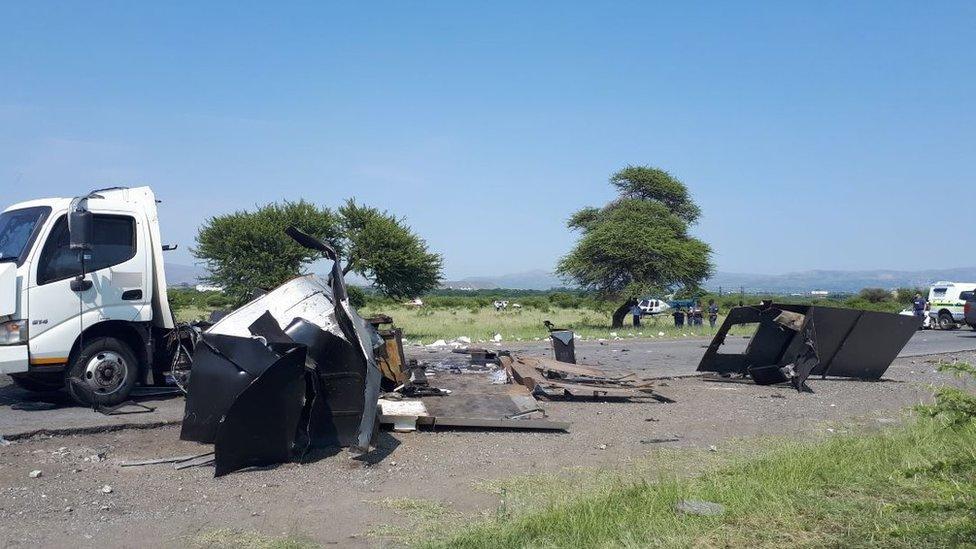
A car riddled with bullet holes was found near this attacked van
Is it true? Brig Mulaudzi tells the BBC the police are not ruling it out, but - like Ms Burgess - he is not entirely convinced.
"I don't understand what the people inside can really help with," Ms Burgess says.
However, she is aware of several gangs who will be released in the medium- to short-term who are already making plans for their release - and it does not involve living a crime-free life.
"They all say it is incredibly easy and incredibly lucrative; the consequences are minimal," she says, raising the question: why would you give it up?
- Published28 October 2014
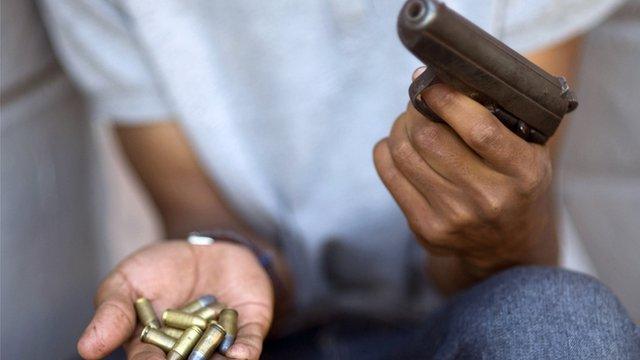
- Published7 June 2018

- Published4 June 2018

- Published29 May 2018
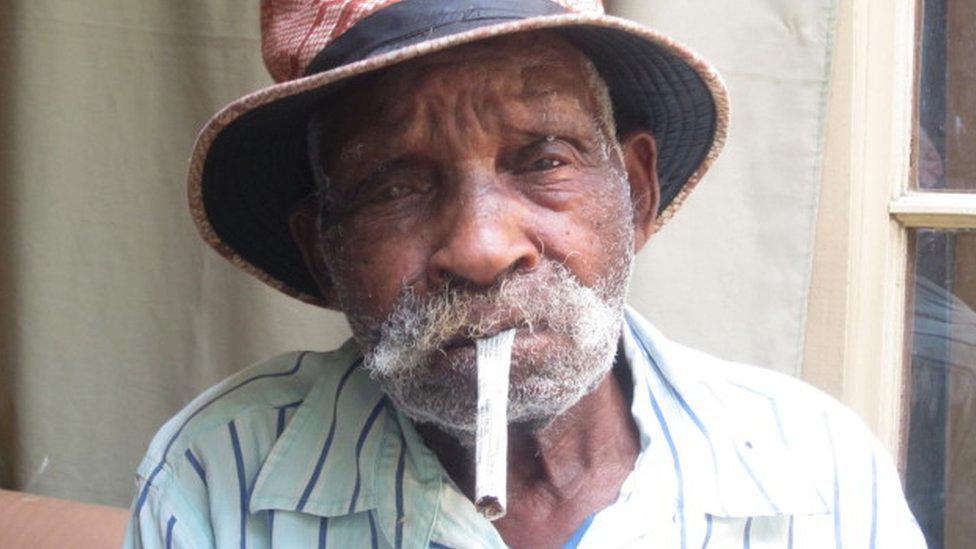
- Published9 July 2024

- Published15 March 2018
